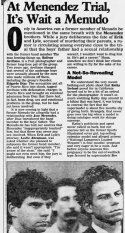Noirdame79
Amateur Sleuth
- Joined
- Dec 14, 2013
- Messages
- 617
- Reaction score
- 1,073
Menendez Reunited
Brothers and victims of parental abuse Erik and Lyle Menendez to be rightly reunited in prison after 22 years apart
Last autumn’s Law & Order True Crime: The Menendez Murders brought renewed interest in the case of Erik and Lyle Menendez, two brothers jailed for life without parole in 1996 for the murder of their parents despite compelling evidence of their having been subject to appalling abuse by the very people meant to protect them.
Yesterday, after 22 years of incarceration without sight of one another, it was announced that the brothers would finally be placed in the same jail “shortly.”
Of this positive news for a duo who undoubtedly received far too harsh a sentence, Hazel Thornton, a juror at the first trial of Erik Menendez and the author of Hung Jury: The Diary of a Menendez Juror, exclusively told The Steeple Times:
“Erik and Lyle were never a danger to anyone besides the parents who terrorised them all their lives. Sending them to separate prisons without even the privilege of speaking to one another for 22 years was just plain cruelty. There are lots of brothers in prison together. I am delighted that they will be reunited. For anyone who’s counting, they’ve now been incarcerated for 28 years. But miracles do happen!”
Elsewhere on Facebook on Wednesday, Lyle Menendez himself commented:
“I would like to wish everyone a Happy Valentines’ Day. I adore my wife today more than I ever have after so many years together. She has been with me throughout this long journey and will be as we embark on a new one.”
“As most of you know, my brother and I have been separated for almost 22 years – captured so tragically on Law & Order. We have been working for the past 6 years to get the Corrections Department to place us together. I have requested to be transferred to San Diego to be with Erik. It has been a long torturous ordeal but never did I feel hopeless.”
“I am very grateful to announce that on Monday the request was finally granted. Erik and I will be reunited in the very near future. We will keep you posted!”
“I would like to thank the huge number of people across the country who felt strongly that my brother and I should be together and took the time to pray for that result and wish us well.”
http://thesteepletimes.com/the-fog/menendez-reunited/
Brothers and victims of parental abuse Erik and Lyle Menendez to be rightly reunited in prison after 22 years apart
Last autumn’s Law & Order True Crime: The Menendez Murders brought renewed interest in the case of Erik and Lyle Menendez, two brothers jailed for life without parole in 1996 for the murder of their parents despite compelling evidence of their having been subject to appalling abuse by the very people meant to protect them.
Yesterday, after 22 years of incarceration without sight of one another, it was announced that the brothers would finally be placed in the same jail “shortly.”
Of this positive news for a duo who undoubtedly received far too harsh a sentence, Hazel Thornton, a juror at the first trial of Erik Menendez and the author of Hung Jury: The Diary of a Menendez Juror, exclusively told The Steeple Times:
“Erik and Lyle were never a danger to anyone besides the parents who terrorised them all their lives. Sending them to separate prisons without even the privilege of speaking to one another for 22 years was just plain cruelty. There are lots of brothers in prison together. I am delighted that they will be reunited. For anyone who’s counting, they’ve now been incarcerated for 28 years. But miracles do happen!”
Elsewhere on Facebook on Wednesday, Lyle Menendez himself commented:
“I would like to wish everyone a Happy Valentines’ Day. I adore my wife today more than I ever have after so many years together. She has been with me throughout this long journey and will be as we embark on a new one.”
“As most of you know, my brother and I have been separated for almost 22 years – captured so tragically on Law & Order. We have been working for the past 6 years to get the Corrections Department to place us together. I have requested to be transferred to San Diego to be with Erik. It has been a long torturous ordeal but never did I feel hopeless.”
“I am very grateful to announce that on Monday the request was finally granted. Erik and I will be reunited in the very near future. We will keep you posted!”
“I would like to thank the huge number of people across the country who felt strongly that my brother and I should be together and took the time to pray for that result and wish us well.”
http://thesteepletimes.com/the-fog/menendez-reunited/













